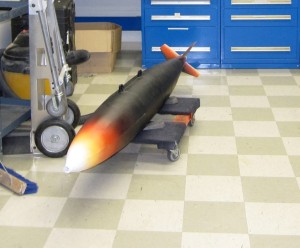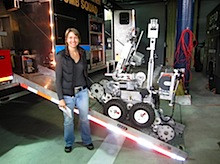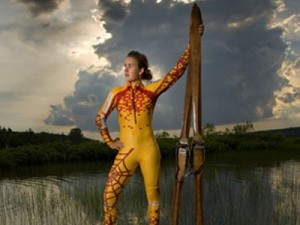Let’s talk about endings today. I’ve been in a bit of a fugue state since LOST concluded on Sunday night. Endings tend to be bittersweet, and this one got me mulling over the final episodes of some of my other all-time favorite shows. Fans of LOST, THE SHIELD, THE WIRE, LAW & ORDER, SEINFELD, THE SOPRANOS, and SIX FEET UNDER, here’s your warning: if you haven’t seen the final episode of these series yet, there are spoilers ahead…
I became hooked on LOST early on. Over the past six seasons it was sometimes fantastic, occasionally maddening, and always puzzling. At the moment, how to draw something to a close is a particularly relevant subject for me, since I recently finished the fourth book in my series. All of those books have primarily focused on the arc of two characters, and with this final book, that arc needed to draw to a close. Mind you, I’m not done with the series, but the focal point will shift with the next book. Because of that, I really wanted to wrap things up in a way that was ultimately satisfying (although not necessarily “happy”). It’s a challenge that most series face. Some rise to the occasion, others fall flat.
So here’s my rundown of the best and worst television series finales. Feel free to chime in on what you thought of each:
- LOST: To be honest, I didn’t have high expectations for this finale. I knew going in that there were so many dangling threads, there was simply no way the writers would be able to tie them all up. Yet I was pleasantly surprised. What I think they gave us, in the end, was viscerally satisfying. The characters that we’ve grown to care about all completed their journey, there were some nice tie-ins to incidents going all the way back to the pilot. That initial episode concluded with Jack saying, “If we can’t live together, we’ll die alone.” As it turned out, living together meant that when they did die, they weren’t alone. The finale didn’t answer every lingering question (what was the island after all? Just a giant MacGuffin?) but it managed to deliver what the show has alway
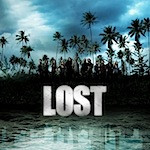 s provided in its best moments. Since the debut it was an emotional ride, focused on the characters and the journey they’ve undertaken together. It provided enough answers to give some satisfaction, while still leaving quite a bit open to debate. I suspect that if the writers had known from the outset how many episodes total they’d have to play with, it would have been a much tighter story arc. But alas, that’s not how the world of TV works. Going in, they never could have guessed what a hit the show would become, and how many slavering fans would dissect every scene. That being said, I think they did a great job. In the end the series shone a light on the true meaning of love and friendship, redemption, and mortality. Some people complained that it was mawkish and maudlin. For me, the sentimentality worked. After all, I’d spent years with these characters. I cared about what happened to them. I wanted things to work out for them- and based on my interpretation of the finale, it did.
s provided in its best moments. Since the debut it was an emotional ride, focused on the characters and the journey they’ve undertaken together. It provided enough answers to give some satisfaction, while still leaving quite a bit open to debate. I suspect that if the writers had known from the outset how many episodes total they’d have to play with, it would have been a much tighter story arc. But alas, that’s not how the world of TV works. Going in, they never could have guessed what a hit the show would become, and how many slavering fans would dissect every scene. That being said, I think they did a great job. In the end the series shone a light on the true meaning of love and friendship, redemption, and mortality. Some people complained that it was mawkish and maudlin. For me, the sentimentality worked. After all, I’d spent years with these characters. I cared about what happened to them. I wanted things to work out for them- and based on my interpretation of the finale, it did. - THE WIRE: Still, hands down, the best show ever produced for television. And the conclusion delivered. As always with this show, things weren’t tied up with a neat bow, because real life isn’t like that. But we saw the torch being passed to a younger generation, for better and for worse. We saw redemption for McNulty, justice for Daniels, and Bubs getting a new lease on life. This was probably my favorite series finale ever. Well done across the board.
- THE SHIELD: Tough one here. I loved the show from the outset for the moral gray area that all of the characters occupied. Like the WIRE, it felt more real than the vast majority of police dramas. It was never as simple as the good guys vs. the bad guys,
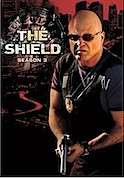 because every character possessed the capacity for both good and evil acts (even Dutch: remember him strangling that cat?) And the conclusion here was grim. In the end, Vic Mackey ended up losing his family and friends, stuck in a day job that was for him a living hell, with all of his crimes brought to light. Things didn’t really end well for most of the characters we cared about: they were either dead, in jail, or alone and isolated. It was the furthest thing from a happy ending, yet it was satisfying, because there was a sense that justice had been done, and everyone ended up paying the price for it.
because every character possessed the capacity for both good and evil acts (even Dutch: remember him strangling that cat?) And the conclusion here was grim. In the end, Vic Mackey ended up losing his family and friends, stuck in a day job that was for him a living hell, with all of his crimes brought to light. Things didn’t really end well for most of the characters we cared about: they were either dead, in jail, or alone and isolated. It was the furthest thing from a happy ending, yet it was satisfying, because there was a sense that justice had been done, and everyone ended up paying the price for it. - SIX FEET UNDER: This finale if right up there for me. The final few minutes in particular, when Claire was driving away from her family to start a new life, interspersed with flash forwards that tied in so nicely to the opening of every episode, were sheer genius. Viewers witnessed the death of every major character in a sort of time-lapse montage video: some demises were funny, others tragic or mundane. Thanks to those snapshots of their future lives, it was probably the most satisfying series ending I’ve ever seen.
- LAW & ORDER: I just watched this last night. I’m not sure if the writers were aware that this particular episode would mark the end of the second longest-running drama on television. Either way, I like that they didn’t over do it. Most of the episode was just like any other installment, although this time (interestingly enough) there was no actual homicide (and if you’re going to get picky, no real reason for Lupo and Bernard to be investigating a potential terrorist threat. But I digress). The final scene with the lieutenant was heartwarming, although the great strength of the show was that viewers were left largely unaware of the personal lives of the characters. You were treated to tantalizing tidbits here and there, but the focus always remained firmly on their work lives (this is why they were able to keep going for twenty years despite a slew of cast changes, in my opinion).
Now, on to some finales that disappointed.
- I realize that this is probably going to spark some debate, but I was one of the people who really loathed THE SOPRANOS finale. There were many far more interesting things they could have done, as opposed to that surreal, disjointed final scene in the diner (Speaking of which, if you missed the LOST alternate endings o
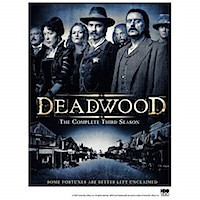 n Jimmy Kimmel, see them here. Brilliant). The writers could have gone back to the pilot, bringing back those damn ducks. They could have had that Russian finally wander back out of the woods (speaking of threads that were never tied up). While I appreciated that they ended with the family, which is largely what the show was about, I still felt let down.
n Jimmy Kimmel, see them here. Brilliant). The writers could have gone back to the pilot, bringing back those damn ducks. They could have had that Russian finally wander back out of the woods (speaking of threads that were never tied up). While I appreciated that they ended with the family, which is largely what the show was about, I still felt let down.
- SEINFELD: Terrible. Just awful. Having the characters end up in jail was absurd, and not in the trademark manner of the rest of the show. It felt forced, nasty, and just plain silly. Worse yet, there was nothing funny about it- which is downright criminal for the conclusion of one of the all-time funniest sitcoms. I have never been more disappointed by the end of a series.
- DEADWOOD: This show ended prematurely, and on a flat note thanks to some serious missteps by HBO. It’s a shame that they’ll probably never be able to get everyone together again for that hinted-at film that was supposed to make up for it. What started with a roar ended with a whimper.
So I’d love to hear what you think of these, and other shows I might have missed. Who did it well? Which finales bombed?



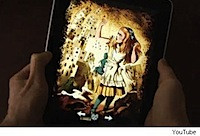


 promised that the “
promised that the “


 Spector case (which, oddly enough, wasn’t nearly as disturbing. But then, what happened to Lana Clarkson wasn’t as terrible as what was done to that little girl). We also had a fantastic presentation from a “Questioned Documents” examiner who explained exactly how easy it is to forge a signature, and what to do to combat that (sign your name over itself 2-3 times) and we toured the labs, including the rooms that hold stainless steel water tanks where guns are fired to match ballistics from crime scenes. Very cool. More information on the lab and the Crime Lab project is available
Spector case (which, oddly enough, wasn’t nearly as disturbing. But then, what happened to Lana Clarkson wasn’t as terrible as what was done to that little girl). We also had a fantastic presentation from a “Questioned Documents” examiner who explained exactly how easy it is to forge a signature, and what to do to combat that (sign your name over itself 2-3 times) and we toured the labs, including the rooms that hold stainless steel water tanks where guns are fired to match ballistics from crime scenes. Very cool. More information on the lab and the Crime Lab project is available 
 rs ago but hasn’t made much progress.
rs ago but hasn’t made much progress. – and realized that they’d only made it through a tiny portion of the entire trail. At that point they flew home, took a break, and met up again later in Virginia, skipping a huge chunk of the hike.
– and realized that they’d only made it through a tiny portion of the entire trail. At that point they flew home, took a break, and met up again later in Virginia, skipping a huge chunk of the hike.
 gave me the tour said that his first call out involved a mortar made out of a highly dangerous and unstable primary explosive, picric acid. They’d all handled the darn thing before one member of the squad turned it around, saw the Japanese characters, and realized that one wrong move could blow the whole place. Fortunately, they made it to their containment unit outside safely (check out the photo of their containment unit. It strongly resembles one of those underwater mines. Any time they pick up explosive material, it gets put in here for the trek back across the city).
gave me the tour said that his first call out involved a mortar made out of a highly dangerous and unstable primary explosive, picric acid. They’d all handled the darn thing before one member of the squad turned it around, saw the Japanese characters, and realized that one wrong move could blow the whole place. Fortunately, they made it to their containment unit outside safely (check out the photo of their containment unit. It strongly resembles one of those underwater mines. Any time they pick up explosive material, it gets put in here for the trek back across the city).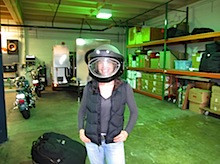 rtable after a few minutes. I asked how they decided which unlucky squad member is sent out in it, and he told me that they usually Rochambeau for it–however, the winner GETS to wear the suit. Apparently being the guy tucked safely in the command vehicle watching everything unfold onscreen is viewed as the unlucky one. Go figure.
rtable after a few minutes. I asked how they decided which unlucky squad member is sent out in it, and he told me that they usually Rochambeau for it–however, the winner GETS to wear the suit. Apparently being the guy tucked safely in the command vehicle watching everything unfold onscreen is viewed as the unlucky one. Go figure.